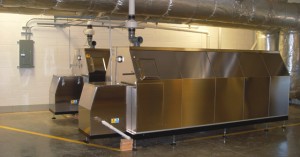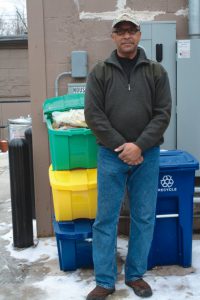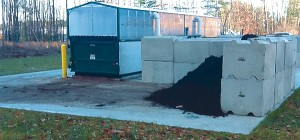BioCycle February 2013, Vol. 54, No. 2, p. 10
Caldwell, Ohio: Correctional Facility Diverting Food Waste
A food waste composting system began operating in January at the Noble Correctional Institution in Caldwell. Funded by a $205,465 grant from the Ohio Department of Natural Resources-Division of Recycling & Litter Prevention, the system has two Big Hanna in-vessel composting units manufactured by Sustenance AB of Gothenburg, Sweden, according to Robert Reiter, district coordinator for the South Eastern Ohio Joint Solid Waste Management District, which received the funding. Food waste is fed into the vessels by a pulping and water extraction unit supplied by Somat Co., which also was purchased with the grant funds. It took about six months from when the grant was received last summer to take delivery of the equipment, install and test it, Reiter notes. In addition, the Class II composting operation’s license did not take effect until January 1. The composting vessels were installed side-by-side within the prison’s Vo-Tech education building.The installation is expected to process about 676 tons/year. “The most positive aspect of this operation is that it will provide operations training for inmates, and produce no adverse environmental air or surface water impact,” he adds. Finished compost will be used on the correctional facility’s grounds, offsetting annual demand for fertilizer in its horticultural, landscaping, gardening, and lawn maintenance programs.
North Plains, Oregon: County Allows Residential Stream Only At Composting Site
Last month, the Washington County Board of Commissioners voted to reduce the level of food scraps composting at the Nature’s Needs composting facility in North Plains, eliminating processing of commercial organics and only allowing residential materials. The decision was made following many months of public complaints about odors at the site. The facility, owned by Recology, receives source separated organics from the City of Portland’s residential organics collection program as well as processes food waste from the commercial sector. According to newspaper accounts, commercial food waste comprises about 80 percent of all food waste processed at Nature’s Needs and is believed to be a primary source of odors at the facility. By eliminating commercial organics, only about 5 percent of the total compost feedstock at Nature’s Needs will be food, reports The Oregonian. The residential stream is commingled with yard trimmings in the curbside organics cart. The board also is requiring Recology to hire a third party odor monitor to measure the impact on the surrounding community. April 1 will be the latest date to accept commercial waste.
Indianapolis, Indiana: Food Waste Collection Service
In January, a new food waste recycling service in Indianapolis, My Composter!, began collecting from business and residential customers. Owner Greg Walton hopes to reach the 600-customer mark by the end of 2013. Residential subscribers are charged a $50 registration fee, plus $10/week for service. Fees for commercial clients vary by frequency of service. Four sizes of bins are available, ranging from 17 gallons to 54 gallons capacity. Collected organics are hauled to GreenCycle of Indianapolis, a local composting operation that produces and sells organic mulches, composts and soil blends. “Our first priority is to establish the habit of separating food waste for composting,” Walton explains. “We are aware that our conversion rate with commercial clients may face an uphill challenge, due to their reluctance to take on what some see as another expense. But, food waste composting can save them money by implementing efficiencies in prep areas and reduces their waste collection fees overall.”Walton owned a “green” cleaning service before starting a consulting firm called Green With Indy to provide environmental solutions and information to Indianapolis area restaurants wishing to become sustainable operations. He decided to start My Composter after realizing that “our city had too few contractors that provided services outlined by the Green Restaurant Association,” he says. “I decided to fill that part of the equation.” Walton adds he’s focused on building the business “one customer at a time. With the assistance of GreenCycle, we’ll be able to concentrate solely on customer education, acquisition and route development.”
Cambridge, Massachusetts: Curbside Organics Collection
The city of Cambridge plans to implement a pilot project for curbside organics collection from 800 households. Slated to begin in April 2014, organics would be collected from a neighborhood yet to be selected within the Monday collection route, according to Randi Mail, Cambridge’s recycling director. City officials made the decision based on a feasibility study conducted last summer, she says. Participation in the pilot would be voluntary; eligible households would include single-family homes and residential buildings with up to 12 units that receive city trash service. Participating households would be given a kitchen scrap container, a year’s supply of compostable bags for the container and a green curbside bin with a locking lid. Filled bags would be placed in the green curbside bin for weekly collection.
In November, the state of Massachusetts promulgated new rules intended to “streamline” the permitting and review process for new and existing composting facilities, Mail adds (“See Setting The Table For An Organics Ban,” December 2012). “They’re trying to make it easier for new composting facilities to be built and easier for yard waste facilities to begin accepting food waste.” The new rules are timely, as the next step in Cambridge’s planning process is to select the composting site to receive the material. Ten possible sites near the city have been identified, some of which “are operating now and accept food scraps, looking to expand their operations or being planned,” explains Mail. “We’re going to wait until April, 2014 to begin the pilot to give the potential sites time to get operational.”
In January, the city began a four-month pilot program for city residents to drop off food scraps at the Cambridge Winter Farmers Market. Residents can also bring food scraps to the city’s recycling center and a local Whole Foods market. Several farms and organics processors in the region are composting the material. In terms of the commercial and institutional sectors, Save That Stuff, a local recycling firm, offers food scraps collection services at a price that is typically the same or less than trash disposal costs. Participants include universities, supermarkets, hotels, cafeterias (hospitals and assisted living homes), restaurants, bars, florists and coffee shops.
Orono, Maine: In-Vessel Composter On Line At University
For more than a decade, the University of Maine had outsourced its composting to a composting operation about 25 miles away from campus. But that changed last November when the university began operating a 44-cubic yard Earth Flow in-vessel composting system next to the school’s Lyle Littlefield Botanical Gardens. The $145,000 unit, supplied by Green Mountain Technologies, is expected to yield significant savings, notes Mark Hutchinson, an Extension Professor in the university’s Cooperative Extension. He estimates the system will pay for itself in about 10 years. About one ton/day of preconsumer food waste is collected from four dining halls on campus and composted. Each dining hall has several 35-gallon barrels for collection. Students and staff from the university’s Resource Recovery program make daily collections. “It takes about an hour per day to collect the food waste and 45 minutes to do the premixing and loading into the machine,” Hutchinson says.The stainless steel in-vessel system is 10 feet wide by 40 feet long by 4 feet tall, with a clear plastic “greenhouse” on top. Three to four cubic yards of carbon material — primarily horse bedding and wood shavings — are added to one cubic yard of food waste. After 15 to 17 days in the vessel at 110° to 165°F, the material is removed to a two-sided, concrete bunker with a concrete floor. After two weeks, the finished compost is removed for curing and eventually used in the botanical gardens, on the university’s hortcultural and dairy farms, and on-campus landscaping. “We’ve been pushing the system pretty hard, but the process has been great,” says Hutchinson. “When the material comes out of the vessel after 15 days, there’s no sign of food waste in it.” Initially, there were some odor issues, but those were resolved by adding a forced-air biofilter (using wood chips) to the system, he adds. University officials are discussing the possibility of expanding composting to include “postconsumer” food and paper waste, which will require an organized effort to educate students and staff on the benefits of composting, Hutchinson notes.
Breezy Point, New York: Home Composters Take Hit From Sandy
Breezy Point, on the westernmost tip of the Rockaway Peninsula in Queens, New York, is surrounded by the Atlantic Ocean and Jamaica Bay. Last October, the small beach community received worldwide attention in the wake of Superstorm Sandy, which caused a massive amount of destruction. What is not as well known are a community group’s initiative to install home composters just before the storm hit. The ‘Green Team’ of the Breezy Point Cooperative reached out to Annie Hauck, a Master Composter and educator specializing in designing, teaching about and troubleshooting home-sized systems. She began working with the Green Team in Autumn 2011. Hauck and the residents concluded that bins made from galvanized metal trash cans with holes drilled in the top, sides and bottom, and a bungeed lid to deter raccoons in the area, was a style that suited their needs. “On October 13, 2012, I returned to train a group of green ‘Pointers’ prepared to start composting,” recalls Hauck. “There were 20 transformed trash cans stacked at the ready, holes previously drilled by volunteers. The workshop was focused on getting those bins set up and working. We topped a base of woods chips in one with layers of damp leaves and kitchen scraps, turned it with an aerator, and rolled the can along the ground to mix the ingredients.” The bins were priced at $20 each, and all were sold. On October 29, Breezy Point was ravaged by Superstorm Sandy. Fires and waves decimated or damaged homes, dislocating Breezy Pointers. Compost bins were washed or blown away. “I look forward to working with residents when they return, helping them restore and restart their gardening and composting,” says Hauck.
San Diego, California: County Leaders Seek Sustainability Through Composting
In 2011, San Diego County Supervisor and Board Vice-Chairman Ron Roberts issued a recommendation “to direct [San Diego County’s] Chief Administrative Officer to explore opportunities for composting at County facilities as well as incorporating composting into the County’s procurement of grounds keeping, food services and where appropriate.” Roberts recommendation also stated that implementing composting programs at select County buildings and operations can potentially achieve cost savings by reducing waste and creating organic materials that can be used in landscaping, adding that it supports the Kids and Safe and Livable Communities initiative in the County’s Strategic Plan and enhances other recycling programs. His recommendation, with the Board’s support, led to food scraps separation and collection for composting at several facilities, including a children’s center and the county’s Administration Center and Operations Center. The program began in 2012 and is already diverting an average of 1.5 tons/month of preconsumer food scraps from landfill to the City of San Diego’s Miramar Greenery Composting operation.
Other initiatives to facilitate composting and diversion of organics are planned, including free assistance to businesses that want to develop programs to cut food waste, manage compostable materials and save money. Any company in unincorporated San Diego County that generates a large volume of edible or compostable material may be eligible for assistance. For more information, visit countynewscenter.com and type “composting assistance” into the search bar.













